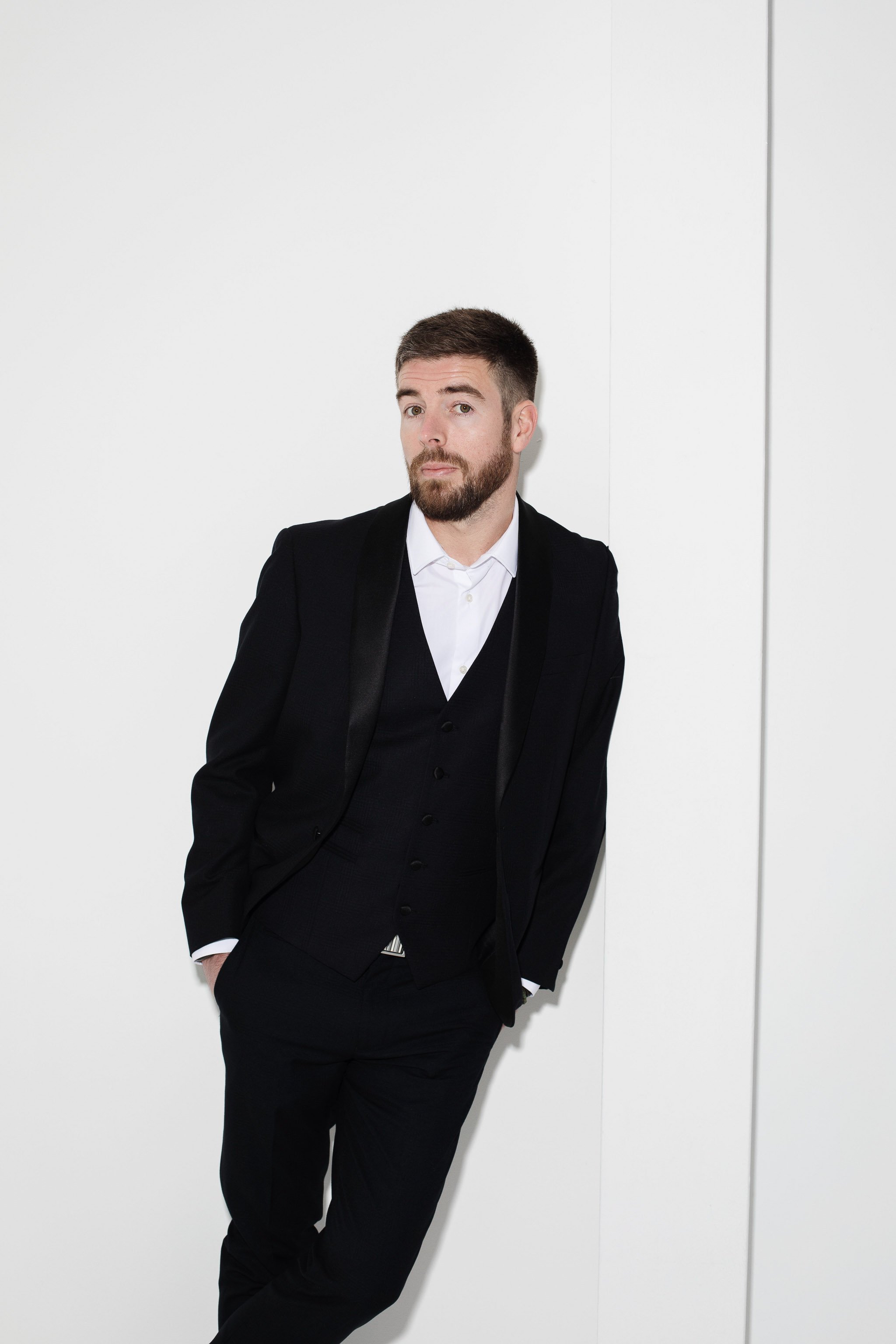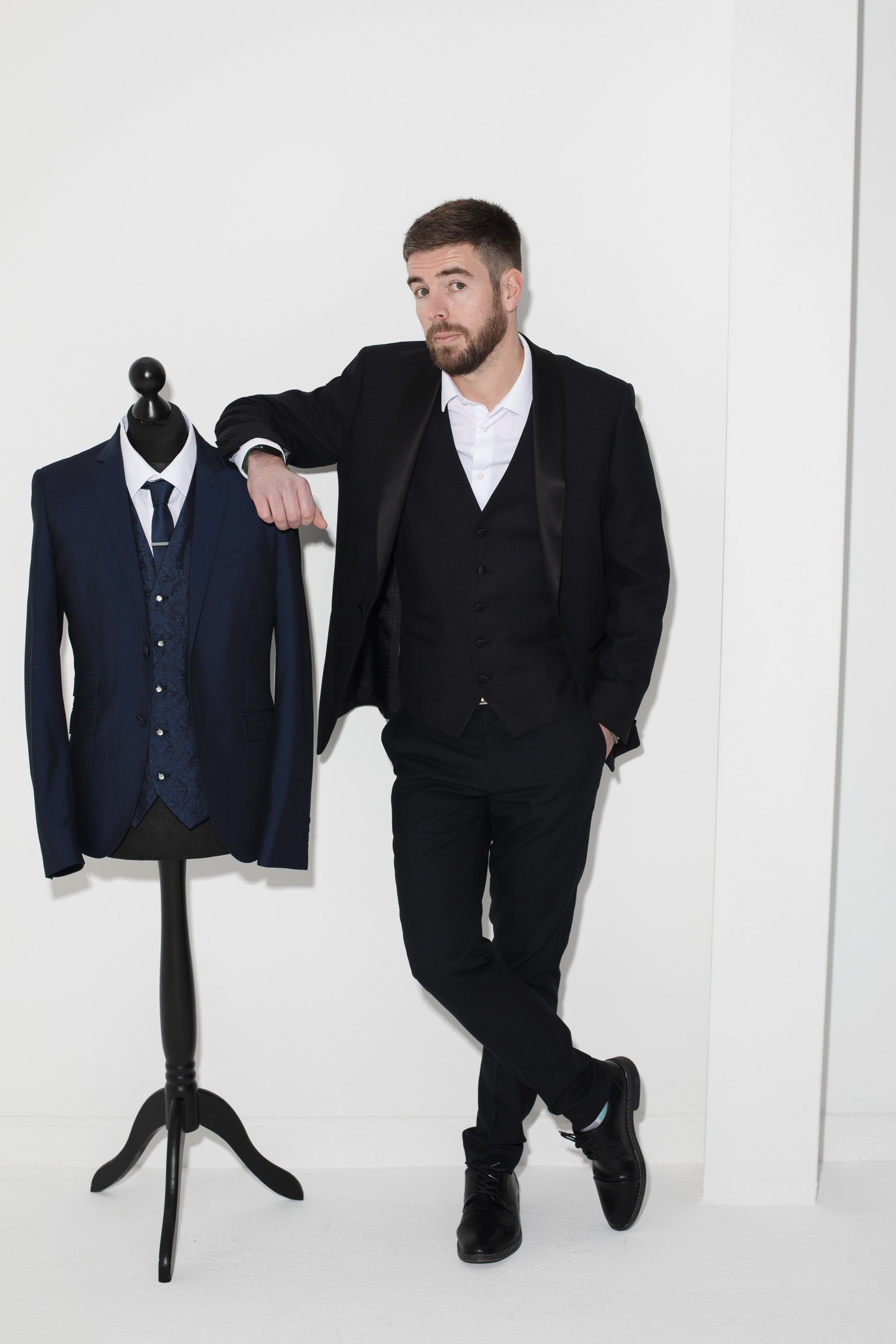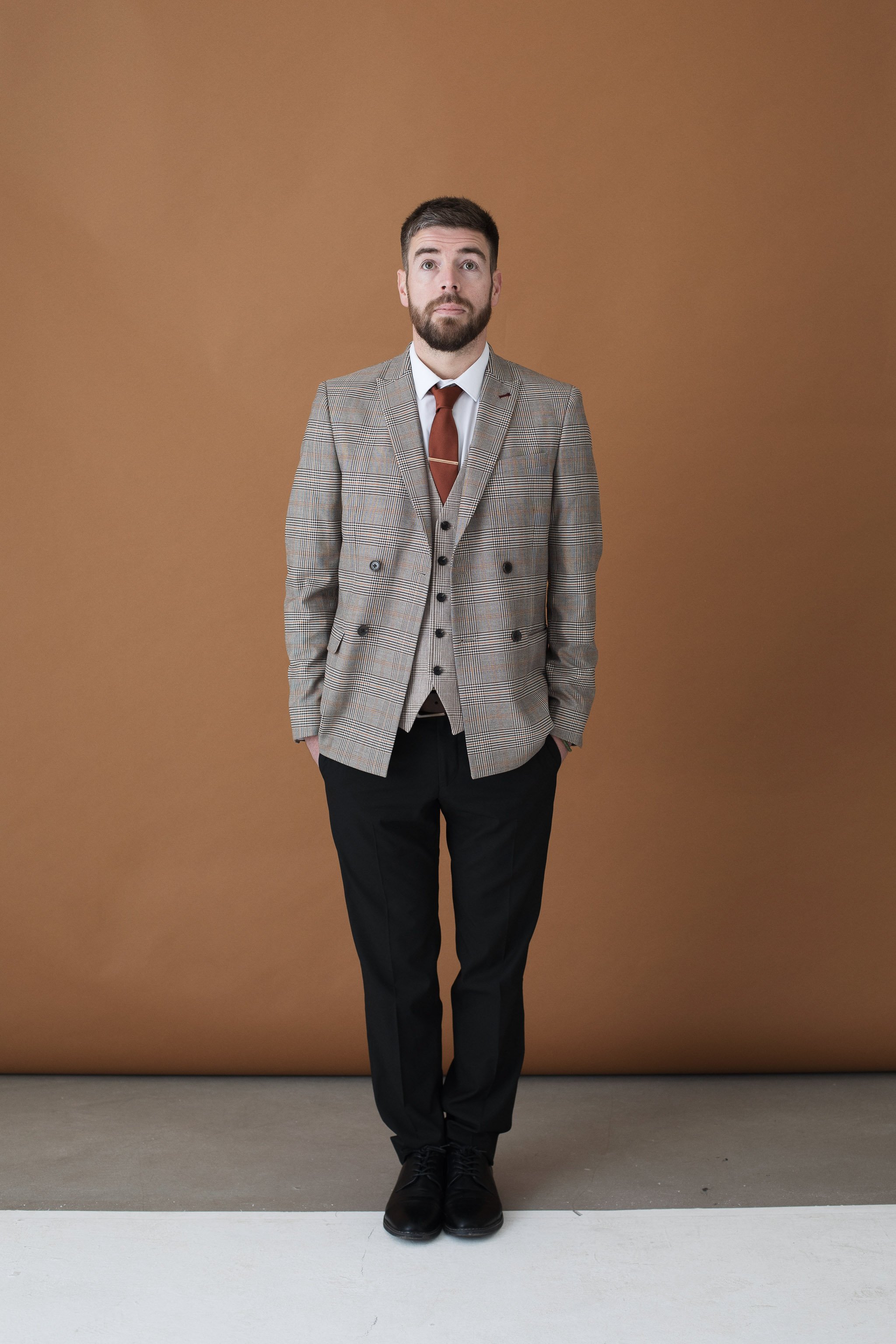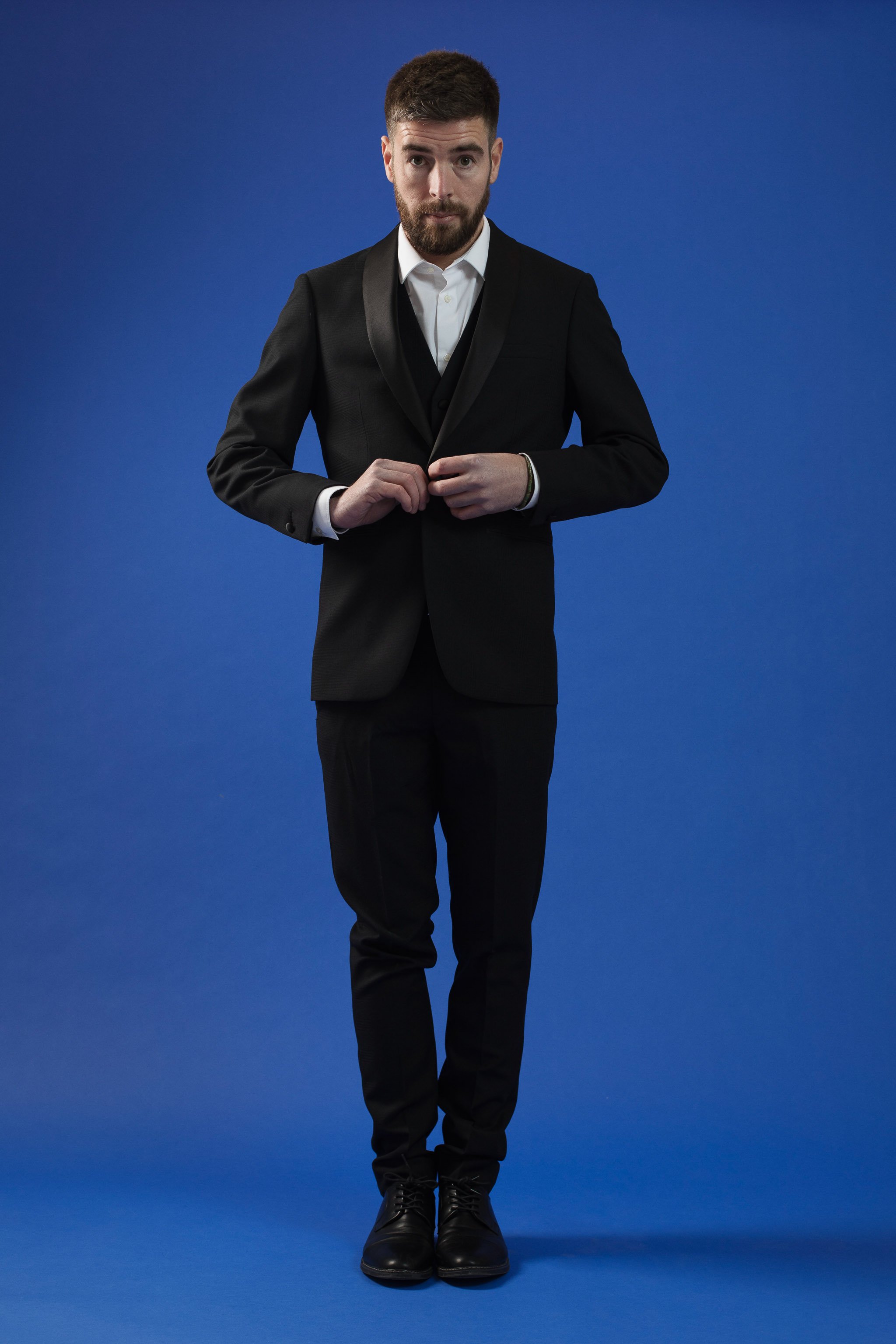Confidence Man
On paper, Darren Tate’s Suitability CIC donates clothes. In reality, Darren donates clothes, confidence and opportunity,doing his part to tackle the tough economic challenges facing the North East.
Interview by Arlen Pettitt
Photographs by Christopher Owens
"Darren Tate is getting married soon. He tells me about his suit fitting in a room lined with racks of formal clothing, and the personalised help he got choosing just the right outfit.
“That’s what I want Suitability to be,” he says, “that experience, but it’s all donated.”
Set up in 2018, Suitability is a Community Interest Company which takes donated interview wear and uses it to support men across the North East in their job search.
Taking referrals from organisations like Job Centres, Citizens Advice or homelessness services, Darren conducts virtual fittings with clients to identify the right styles and sizes for them, before dropping the clothing at their door.
Starting out of his parents’ garage, the first suit out the door was his own. Suitability swiftly expanded from the garage into the attic as well, and Darren now has a storage unit full of suits, shirts, shoes and smart trousers - donated both by individuals and brands like Master Debonair and Next.
“I’ve always had that want to understand people,” Darren says, “and enjoyed trying to understand their barriers. I’ve always had that ability to look at things differently and get structures in place from the ground up.”
Running Suitability alongside his day job, Darren supported more than 100 men in 2021 with 75% of those finding work. Last year saw Suitability work with 66 gents (56 of whom went into work), as Darren slowed down a little to focus on getting the CIC on a sustainable footing.
Now with a small amount of funding secured, he’s able to cover ongoing storage costs and focus on delivering the service.
“I want to give people their personality and their dignity back. If someone feels confident in a suit, then brilliant, and if it’s just a tie and a shirt, then that’s great too. It’s about alleviating that barrier of the cost.”
Darren’s clear on why it’s important.
“I want to give people their personality and their dignity back. If someone feels confident in a suit, then brilliant,” he says, “and if it’s just a tie and a shirt, then that’s great too. It’s about alleviating that barrier of the cost.”
“A white shirt and a pair of trousers, even from a place like Primark, might be £30,” he explains. “What if you don’t have that? Or if you’re prioritising the bus fare to get to the interview, or eating or putting the heating on? I want to be a service where people are referred in and they don’t have to justify it.”
Helping people deal with barriers is a thread which runs through Darren’s professional life.
After thirteen years as a support worker for people with acquired brain injuries, he then spent four years with a charity which helped those with physical or mental health problems back into work. It was while working there that he realised the need for a service like Suitability, having accompanied one of his female clients on a visit to the North East branch of national charity Smart Works.
“Seeing how they empowered women, gave them confidence through the wonderful clothing,” he says, “I thought ‘where’s the men’s’?”
Darren now juggles Suitability with a full time job in the NHS as an employment specialist within a community mental health team, and you get the sense he’s rarely without several suits in the back of his car.
Indeed, Suitability’s social media feeds confirm how busy he is, as they are full of notes confirming donations or referrals alongside messages of good luck to the gentlemen heading for job interviews.
Given there are only so many hours in the day, what does Darren see as the future of Suitability?
"I want to get premises, like a retail shop" says Darren, "where you can try on the clothes, but it’s all donated. A bespoke service, because everyone should have at least one good suit.”
“My aim, the three or five year goal, is I want to have those headquarters for that main contact, and then community hubs that have really good quality clothing that’s more accessible for gents."
He also sees a critical role for strategic partnerships with others - where his gents can access a barber, perhaps a stylist, and broader support focused on boosting the confidence of the men who'll be coming through the doors.
“Employment’s always the goal,” Darren explains, “but there’s so much more around whether it’s benefit advice, or wellbeing or mental health in terms of signposting services. I’d love to have it where people are coming in and having chats with mentors for sector-specific help. Have people got a LinkedIn profile set up? Where are you looking for jobs?”
He sees a place for Suitability earlier in the career journey too, and is exploring ways to work with the region's schools, colleges and universities.
This isn't just about helping young people access interview wear, it's also a chance for business, marketing or fashion students to take the lead, with Darren supplying the stock of donated clothes, talking them through the process and then leaving them to run it for the benefit of their peers.
"You've got marketing students, you’ve got stylists," says Darren, "and it enables me to create a bigger impact than having those hundred suits in storage. It gives students an idea of what work looks like, something to put on the CV, and that drive."
"If you're doing a college course but aren’t immersed in business, or you don't get the right kind of advice," Darren explains, "once the course is over you might be out in the big, wide world. Even though I've never thought about Suitability as a business - it’s what I do in my own time - I've still got my own experience to share from four years of developing it."
“I’ve always had that want to understand people, and enjoyed trying to understand their barriers. I’ve always had that ability to look at things differently and get structures in place from the ground up.”


From the moment we meet, Darren is an immediately warm and open presence. He’s full of enthusiasm for supporting the people who use his service - he refers to them throughout as gentlemen or gents, testament to his desire to instil confidence and dignity.
However, despite the clear need for what he does and effectiveness of the way he does it, he retains a self-critical streak and knows first-hand the value of that confidence he’s trying to give away to others.
He tells me how one of his gents gave him a boost.
“He was a prime example of what Suitability is,” Darren recalls. “He went into his interview and was the only one wearing a suit. The provider has said thanks for making an effort and he’s said ‘actually it’s a donated suit from Suitability’. For him to be an advocate and talk to the employer about it has given me a lot more confidence, where before I’ve always wanted to sit in the background. Now I want businesses to get involved, if they’ve got job opportunities say ‘if you need advocacy services or are struggling with the clothing then please contact…’”
We talk about his feelings of imposter syndrome when he first spoke to business students at Newcastle University, his nervousness at the beginning admitting Suitability was just him and his initial hesitancy to put himself out there on social media or in other forms of promotion.
He needn’t have worried. He was a 2020 finalist in the Great British Entrepreneurship Awards, has featured in the Theo Paphitis Small Business Sunday campaign, and social media has helped Darren grow Suitability too: “I put out a Tweet on a Tuesday and by the Friday I had a 20 foot storage unit for free, for 9 months”
I suggest to Darren that the North East is a good place for that sort of thing, because of that sense of community, and as well as that help from storage company U Hold The Key, he mentions support from Sunderland Software City on Suitability’s website and more recently the value of connecting with Steve Pugh of RoadmapMBA and Alex Wright of Woeman.
These are human connections as well as business ones and Darren has plenty more human stories - the man he took to Primark who’d never owned a suit before and couldn’t believe it when Darren took him to the till; a woman whose husband had passed away who wanted his wardrobe full of suits and ties to go to something positive; the gent who received a donated suit and went on to become a DWP adviser and is now Suitability’s biggest advocate.
During 2021, when Suitability supported more than 100 men, Darren admits to using all his annual leave, along with evenings and weekends, conducting virtual fittings and dashing all over the region dropping off donated clothes.
A dedicated, but unsustainable, approach to a service run by just one person.
“I always looked at that as my barrier,” says Darren, “and thought that when people noticed it’s just one person they’d choose not to refer. But when I’ve opened that dialogue, the organisations I’ve worked with are absolutely lovely. No one else is doing it, but they know it’s just me so they think about how it complements each service.”


"I want to get premises, like a retail shop, where you can try on the clothes, but it’s all donated. A bespoke service, because everyone should have at least one good suit.”
The region certainly needs all those services to pull together.
The North East has an unemployment rate of 4.7%, well above the national average of 3.7%, with an economic inactivity rate of 25.2%, again well above the English average of 21.1%. The region also has a high level of workless households, with 19.1%.
Those figures are concerning enough, but mask the severity of the issue for certain groups in our region - for men aged 18-24, unemployment is estimated to be 13.8% and economic inactivity at 32.4%.
Looking more closely at economic inactivity, there were 178,000 men classed as inactive in the year to June 2022 (the latest figures available). Of those, 37.9% are out of work due to long term sickness, and 45,000 say they want a job.
I ask Darren for his views of what the region needs to do to address some of these problems. He’s typically pragmatic.
“Yes people might have physical or mental barriers to work, but actually it’s about finding those adjustments,” says Darren. “People can have those conversations with employers, or with services, that can enable them to do meaningful employment. So we’re not just ticking boxes.”
Darren is keen to dispel myths about who these issues can affect too, and who might therefore need some extra support.
“People always think it’s job seekers for those lower level roles, but I’ve got teachers and people who are returning to roles which are £60,000-£70,000 job roles, but at the end of the day they can’t justify spending the money on something they’re wearing for an hour,” he says.
Those conversations, and that need for a different solution for each person, really come through in what Darren is trying to achieve with Suitability.
“Being able to provide that service to people from all different backgrounds, I want to give that personal touch. If people come in and say ‘actually, I want to try that navy suit or a different tie’, to be able to be open how that looks.”
He sees a proactive role for businesses too.
“When I put myself out there, businesses do want to get involved. It’s all about sustainability and interacting in different ways and finding different ways to support people. I want to have those meaningful conversations. What people might deem to be their barrier, through the right conversation it could be sorted or supported, or they could be put on the right facilitated pathway.”
Get that right, Darren argues, and we’ll all benefit - businesses, individuals and the region as a whole.
“There are organisations out there that aren’t getting the right cohort of people applying for jobs, you’ve got to say ‘well, how can we change those applications?’ by being a bit flexible in what that employment or that role looks like. Having that kind of reasonable adjustment can really support people, it’s simple to put in place but they’ll thrive.”
“That’s what I hope will happen anyway!” he adds, with characteristic optimism.
It’s a positive note to end on, but you’d expect nothing less from a man who dispenses confidence for a living.





